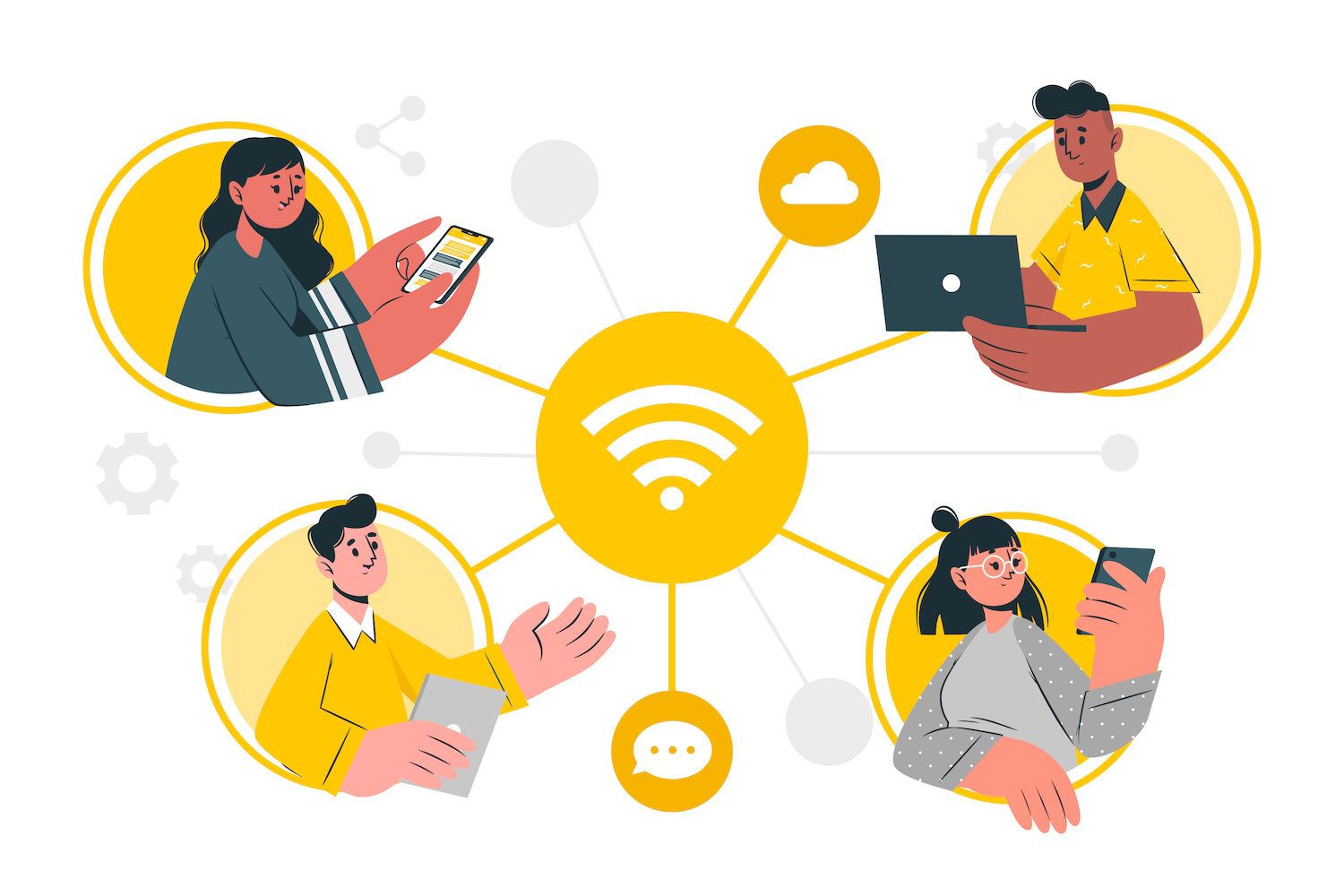What is Online Community Management? |
If you're trying to improve community management online, whether on social media or an exclusive community area This article will explain what you must learn regarding community management.
What exactly is community management?
Community management is the process that determines the type of interactions customers interact with your company usually on the internet. Many brands hire someone specifically for this function, and are referred to as a community administrator. In reality one of Instagram's initial hirings was for a community manager.
Community management online requires active listening and engagement on behalf of the brand especially through social media channels. Community managers basically represent the brand, and they can perform promotions, customer service and fun activities for engagement, and even public relations as well as damage control.
A well-managed community makes brands appear less an unreachable entity, and instead... well... real. If done right it can give the brand a voice, persona and can make people experience something. This is why it's such an essential part of any customer engagement plan.
Customers who are currently and in the future should love interacting with your brand online. It is said that "people prefer to do business with people they know, like, and trust," and good community management can create this sense.
However, community management can bring a bunch of other benefits to your business too. It could help you gather useful feedback about your products and services, figure out where people have issues (their customer experience) and also the most appealing selling factors are. For these reasons and more If you're a company, brand or a business, you must think about incorporating a community management approach into your customer service.

The growth and power of communities on the internet
The demand to manage community has grown since we spend longer trying to locate the community on social media, or dedicated communities.
Did you know?
- 86 percent of Americans (90 million) are in contact with an online community (Pew).
- 79% remain on regular contact with at least an online group (Pew).
- A study from 2019 found it was 76% of internet users were involved in online community forums.
- The biggest chunk of creators on the internet are small-scale businesses (est. 168+ million).
- 50% of respondents of an Pew survey stated that being part of their online communities helped them get to know people that they might not otherwise know.
- 93 93% of customers use social networks to find assistance with technical issues related to a product (Oracle).
- 20% of consumers have made a purchase of something due to posts on social media (Oracle).
- 37 percent of people believe in brand influencers and brands (Oracle).
- In 2023, creator incomes climbed by $370 millions.

Advantages of online community management
Once you begin actively managing your online community-whether you refer to it as social media or an exclusive community space-some amazing things start to take place.
- Make a buzz and create conversation around your brand
- React quickly and effectively to potential PR disasters
- Improved customer advocacy through conversation with real users
- Find ideas for innovative items and products
- Revenue boosting or opening new streams of monetization
A community manager can be an empowering. And since 98% of customers are annoyed by customer support channels (and dislike answering the phone) and having the opportunity to have a positive experience with someone who is representing a company (or perhaps even getting assistance) can be a huge positive change!
What exactly is community management in the online community?
There are times when we speak of managing communities online. Community management within an online community is the process of applying the principles of community management, which includes hosting a conversation, generating communities, and increasing the brand's popularity within a specific community.
Many of the same practices can apply to online communities, however it offers a different way to engage targeted engagement, which can make community management unique and (we'd argue) superior.
Community management in an online community means:
- There's no need to persuade individuals to become interested in your company. When they sign up the brand, it's due to their interest.
- You're not siloing content and efforts across different platforms of social media. Instead, the attention is focused.
- The focus is exclusively on the content that users create (more about this in the next section) This means that you will perform less work than the social networks.

The job of community manager
A community manager is a person who is responsible for being the face of the brand to online followers typically, becoming the spokesperson for the brand to people in their circle and also the voice of the customer to the brand. It's crucial to understand that community managers are not simply content creators. Though they might make content, a manager's role is more of a relationship builder and connector.
The problem with traditional social media is that often community managers become celebrities as content creators. That's for a reason: Social media companies weren't created to build communities, they were designed for broadcasting and creating followers. So, often, brands opt for"community managers" or "community manager" to be the one who answers questions people ask through social media. They also have the option of throwing out a witty response or post on behalf of the brand.

When it comes to a specific community platform, the role of a manager for a community is unique. Instead of trying to get attention or do tech support, a community manager assists members in engaging with fellow members in search of community and belonging. They hold great conversations and host interesting live activities.
When it comes to platforms designed for community, community managers are the ones who shine.
Tech's role
We're also seeing a lot of new technology being introduced into the field of community management and promising more engagement and connections. For example, on the traditional social networks community managers may rely on tools for scheduling and monitoring mentions (e.g. Hootsuite or Sprout Social) or perhaps the net promoter score (NPS) tracker software.
Also, we're seeing community technology evolve to change the roles of community managers and make life way easier. The more advanced community platforms become their capabilities, the more they will empower community administrators (and make it easier for them to manage their time). Modern community platforms provide tools for:
- Tracking and management of member
- Messaging, discussions, comments, polls, etc.
- Live streaming and live events
- Instruction and classes
However, at Mighty, we're also really excited about the use of technology to build stronger communities. And we've already seen this make waves in community management.
In the case of Mighty Co-Host(tm) the team is employing tools like profile assist, question generators as well as the "make more effective" writing editor, and auto course outlines to make the job as a community manager simpler than it has ever been. This will help to streamline and reduce the administrative work in communities so that you can focus on creating real, human connections.
How to master the art of community management
If you're trying to master community management you should be aware of the following principles that you must know. Use these tips to witness an actual change within your community
- Make sure you are clear about your primary goal. A Big Purpose is your purpose, it's the reason individuals want to connect with you or your company. Usually, the Big Purpose is the change that you wish to see for your customers. Therefore, your efforts in managing the community are to help to achieve that transformation. Whether you're inspiring, instructing or resolving technical issues-it all helps the members to fall in love with each other.
- Find a sense of belonging. The true art of community management isn't just about engagement. The magic happens when you build a sense of the feeling of belonging.
- User-generated content that is prompt. People liking a brand article doesn't really mean anything. But people posting about your business? This is worth its weight in gold. In some cases, when the best way to do it is through giveaways and hashtags may encourage UGC. In a dedicated community, UGC happens more organically as you host a conversation about what members are concerned about.
- Choose the right platform. Finding the best platform for your community management can transform the entire process. For example, there's an enormous difference between a community that's an online forum on the backend of a company site and one that integrates livestreaming and events to conversations through the form of an app.
- Set clear guidelines. Psychological safety in the community is essential. That's why community rules and moderation in a dedicated community is essential. Helping people feel safe and comfortable (and guarding them from being targeted by trolling and harassment) is vital to having the development of a healthy community.
- Create rituals. The rhythm of a community matters by having regular routines and a consistent set of actions help people to feel a part of it. As an example, arranging the possibility of a live event every quarter or even a livestream every week can become a meaningful ritual.
- Create feedback loops. Then, all members of a community should be able to provide feedback to and through an administrator of their community an authentic method. Community managers usually seek out feedback with things like surveys.

Measuring the Success
Key Performance Indicators (KPIs)
There are different ways to measure the success of your work in community management using traditional social media, or within a specific online community.
Social media that is traditional
- New likes follow-ups, comments, and likes. It's the most straightforward, but an increase in social followers can show that community management efforts pay off.
- Increased relevant organic searches. The excitement that a brand can generate through social media is often reflected by the increase in organic search.
- Positive content or questions regarding your brand which aren't yours to create.
- The trend is upward. You could use a tool such as Google Trends to track the increases in the brand's awareness.
- Increased Net Promoter score. Measured through surveys, the NPS is a measure of how likely consumers are to refer someone else to your brand.
- Increased conversions. There's not always a straight line between buzz on social and conversions, but sometimes you can see a connection-especially with huge events or viral posts.
In a community
- Engagement. For any community online, active users are the first success metric-whether they are joining and participating. The community platform must give the community with detailed analytics that tell you how often users sign up and how active they are.
- growth. If a community is growing and adding new members it's an indication that the community management is successful.
- A low rate of churn. New members will not really matter if there is a high turnover. Ideally, they will stay around too.
- Increasing the revenue. When your neighborhood falls under your revenue structure, good community management can lead to a rise in revenue through a flywheel for the community. A typical community that has membership fees that are on Mighty is charged $48 per month.

Why do you need community software for community management?
The discussion has already been made about the management of communities via social media as well as community management in a dedicated community. There is a distinction. It is difficult to control "community" on social media is guesswork. It almost never really works-especially on a level of brand.
That's the reason why switching to a dedicated online software for managing communities is a great idea. It can transform your life. The issues that arise of social media that specially designed community management software will solve:
- Silos: Community management in social media can be a challenge due to the silos of content. Even if you get some engagement that's occurring on several platforms. The ability to bring members together allows you to focus on and observe results.
- The treadmill of content: social media could be a gruelling process for companies, wondering what they should create, and - let's admit it, most of your efforts fall flat. The right community platform will transform you away from the content treadmill and into an actual community. In a community, the administrator's work isn't actually creating but coordinating.
- Inconsistency: Social media let you have no control. It's your battle with the algorithm, and no matter which one you're on, most of your followers never see the content. A dedicated platform doesn't keep your battling to get noticed.
When brands move into dedicated communities, the management becomes totally different. Instead of trying to garner the attention of others and get their reactions it is better to be focused on developing relationships with members who want to be there.
So what will happen when you establish your brand community on dedicated software?
- The more value you can provide to each member. As you focus on making members belong instead of chasing followers and likes.
- Brands that build themselves. The promise of community management software is nothing to ignore-a brand that can build itself. This is a huge deal. Because when you bring people in a deliberate and dedicated space, that's the result. The energy flows and the brand's reputation increases.
- It's possible to unlock REAL UGC. When you're on social most of what you could hope for from user-generated content is a few posts about your company. However, on a social platform, you're hosting the discussion. Participants show up
For example, Lego. Lego is a master of online community building using the ability to let builders create designs. The best ideas become Lego kits!

Conclusion
The management of online communities is crucial, and will probably only grow in significance. At a minimum, it can create conversation about a company's brand. But having focused community spaces can open up ways for participants to be part of something that's really transformative.
